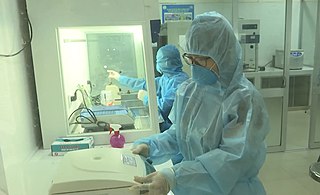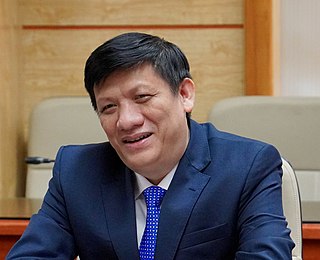
Nagasaki University is a national university of Japan. Its nickname is Chōdai (長大). The main campus is located in Bunkyo-machi, Nagasaki City, Nagasaki Prefecture, Japan.

Bach Mai Hospital is a multi-field medical facility in Hanoi and is considered one of the largest in Vietnam. The hospital was established in 1911 during the French colonial rule. It has played an important role in the health system of Vietnam and is one of three high specialized medical centers, specializing in internal medicine. It is a big center of cadres training and scientific research in the country. The hospital has 3,500 beds and 4,300 staff.
Vietnam National Children's Hospital (VNCH) is a medical facility in Hanoi. Initially established in 1969 as Institute for the Protection of Children's Health. It was also known as Vietnam-Sweden Children’s Hospital, Olof Palme Pediatric Institute, and National Hospital of Pediatrics (NHP) before adopting its present name in 2016.

Đống Đa is one of the four original urban districts (quận) of Hanoi, the capital city of Vietnam. It is bordered by Ba Đình to the north, Hoàn Kiếm to the northeast, Hai Bà Trưng to the east, Thanh Xuân to the south, and Cầu Giấy to the west. The district currently has 21 wards, covering a total area of 9.95 square kilometers. It is the most populous district in Hanoi. As of 2017, there were 420900 people residing in the district, the population density is 42302 inhabitants per square kilometer, 18 times higher than the overall density of Hanoi. Dong Da district is home to various enterprises and many of Vietnam's most prestigious universities such as Hanoi Medical University, Foreign Trade University, University of Transport and Communications, Thuyloi University.

Hanoi Medical University is the oldest university of Vietnam and is located in Hanoi. HMU was founded in 1902 by French during the French colonisation under the name Indochina Medical College. The first headmaster of HMU was Alexandre Yersin who was the co-discoverer of the bacillus responsible for the bubonic plague or pest, which was renamed in his honour.

Health in Vietnam encompasses general and specific concerns to the region, its history, and various socioeconomic status, such as dealing with malnutrition, effects of Agent Orange as well as psychological issues from the Vietnam War, tropical diseases, and other issues such as underdeveloped healthcare systems or inadequate ratio of healthcare or social workers to patients.
The Hero of Labor is the highest title of honor in the Socialist Republic of Vietnam. It is awarded to individuals or collectives with outstanding achievements in labor. This includes supporting the objective of a strong country and an equitable, democratic, prosperous, and civilized society. Awardees are loyal to the Socialist Republic of Vietnam, and possess revolutionary virtues and qualities. It can be awarded to collectives for the same reasons that have maintained good internal unity, strong Party affiliations and mass organizations.
The Institute for Tropical Medicine, Travel Medicine, and Human Parasitology specializes in infectious diseases, tropical diseases and human parasitosis. With a staff of about 100, it operates a tropical medicine and travel medicine outpatient clinic, as well as teaching and research projects in tropical medicine.
Peter Gottfried Kremsner is a specialist in tropical medicine and Full Professor at the University of Tübingen, Germany. Since 1992 he has been leading the Centre de Recherches Médicales de Lambaréné (CERMEL), Gabon, now as president.

The COVID-19 pandemic in Vietnam has resulted in 11,623,571 confirmed cases of COVID-19 and 43,206 deaths. The number of confirmed cases is the highest total in Southeast Asia, and the 13th highest in the world. Hanoi is the most affected locale with 1,649,654 confirmed cases and 1,238 deaths, followed by Ho Chi Minh City with 628,736 cases and 20,476 deaths; however, the Vietnamese Ministry of Health has estimated that the real number of cases may be four to five times higher.

Nguyễn Thanh Long is a Vietnamese politician and doctor who served as Minister of Health from July 2020 to his removal from the Communist Party of Vietnam in June 2022 for involvement in the Việt Á corruption scandal. During his term as Minister of Health, he was in acting capacity from July to November 2020. He has been noted for being one of the chief strategists of the response of the Vietnamese government to the COVID-19 pandemic.
The following is a timeline of the COVID-19 pandemic in Vietnam.

The COVID-19 vaccination in Vietnam is an ongoing immunization campaign against severe acute respiratory syndrome coronavirus 2 (SARS-CoV-2), in response to the ongoing pandemic in the country. Following the approval of the Oxford–AstraZeneca COVID-19 vaccine on 30 January 2021, vaccinations commenced on 8 March 2021, and will continue throughout the year with the goal of vaccinating 80% of the population by June 2022. The Sputnik V was later approved for use on 23 March 2021. The Sinopharm BIBP vaccine was approved for emergency use on 4 June 2021, while Pfizer–BioNTech COVID-19 vaccine, Moderna COVID-19 vaccine and Janssen COVID-19 vaccine were approved on 12 June 2021, 29 June 2021, and 15 July 2021, respectively. Vietnam approved Abdala vaccine from Center for Genetic Engineering and Biotechnology on 18 September 2021, and Covaxin from Bharat Biotech on 10 November 2021.

Vabiotech COVID-19 vaccine is a COVID-19 vaccine candidate developed by the Vaccine and Biological Production Company No. 1 (Vabiotech) in Vietnam.

ARCT-154, also known as VBC-COV19-154 in Vietnam, is a COVID-19 vaccine candidate developed by Arcturus Therapeutics. For its development, Arcturus collaborated with Vinbiocare, a Vietnamese company, for support with clinical trials and manufacturing.

The government of Vietnam prepared for the COVID-19 pandemic as early as the first cases in China emerged in mid-December 2019, and pursued a zero-COVID strategy until September 2021. Vietnam's Prime Minister Nguyễn Xuân Phúc ordered measures to prevent and counter the spread of the disease into Vietnam, as well as to warn Vietnamese citizens to avoid visiting areas with outbreaks.
Guy Edward Thwaites is a British professor of infectious diseases at the University of Oxford, and director of the Oxford University Clinical Research Unit (OUCRU) in Ho Chi Minh City in Vietnam. His focus is on severe bacterial infections, including meningitis and Staphylococcus aureus bloodstream infection, and tuberculosis. He is a former first-class cricketer.
Vietnamese-German Center for Medical Research (VG-CARE) was founded in 2015.

On 12 September 2023, at around 23:00 ICT (UTC+07:00), a fire occurred in a ten-story microapartment building in the 29th alley of Khương Hạ street, Khương Đình ward, Thanh Xuân district, Hanoi, Vietnam. Of the approximately 150 people residing in the building, 56 were killed by the fire and 37 others were injured. It was the deadliest residential fire in Vietnam since the 2002 Ho Chi Minh City ITC fire.












